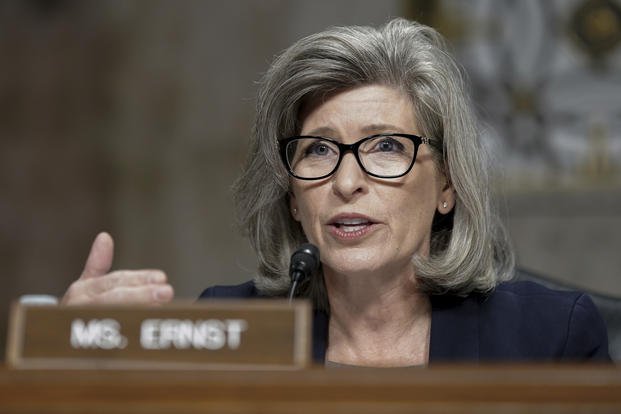A Republican-sponsored provision tucked into the Senate's version of the annual defense policy bill seeks to crack down on stolen valor by targeting businesses that lie about being veteran owned.
Small businesses that only self-certify as being service disabled and veteran owned could not count toward the government's goal of having 3% of contracting dollars going to such businesses, under the provision by Sen. Joni Ernst, R-Iowa, in the Senate's National Defense Authorization Act, or NDAA.
While the bill would not eliminate self-certification or prevent contracts from being awarded to self-certified businesses altogether, the aim is to incentivize federal officials to award contracts to formally certified businesses and thereby disincentivize stolen valor.
Read Next: Marine Drill Instructor Not Guilty. To Family of Dead Recruit He Said, 'I'm Sorry'
"As the first female combat veteran to serve in the Senate, I know that our service members have the grit, talent and leadership abilities needed to become successful small-business owners following their time in uniform," Ernst, who championed the provision as the ranking member of the Senate Small Business Committee and a member of the Senate Armed Services Committee, said in a statement to Military.com.
"I'm grateful that my effort to prevent stolen valor and enhance integrity in federal contracting for service-disabled veteran-owned small businesses passed through the Senate NDAA with bipartisan support," she added.
Before becoming law, the provision must still survive negotiations with the House on the final NDAA, which are expected to be contentious due to unrelated issues.
Asked about the prospect of the provision surviving in a final version of the bill and being passed into law, Ernst's office noted that it was added to the Senate's NDAA unanimously through a "manager's package," which is a group of amendments that are considered non-controversial and were added to the bill in a voice vote.
At issue is the Service-Disabled Veteran-Owned Small Business Program that allows the federal government to restrict competition for some contracts to just businesses owned by veterans with service-connected disabilities.
In the 2021 NDAA, Congress required the Small Business Administration, or SBA, to set up a process to certify veteran-owned and service-disabled veteran-owned small businesses. Previously, the Department of Veterans Affairs certified whether a business was owned by a service-disabled veteran for the purpose of awarding VA contracts, but businesses only needed to self-certify for contracts awarded by any other federal agency.
In late 2022, the SBA did not entirely eliminate the ability to self-certify despite receiving some public concerns about fraud. Among the ways the SBA continued to allow self-certification was for the purpose of meeting the government's goal of 3% of contracting dollars going to small businesses owned by service-disabled veterans.
In keeping self-certification alive, the SBA said it was consistent with other programs, such as the Women-Owned Small Business Program, that allow for self-certification. Still, the agency said it plans to do a comprehensive review of all self-certification programs and anticipated sunsetting any self-certification in five years.
The SBA estimated that applying for and maintaining formal certification would take businesses about three hours and cost $280.32 per applicant.
"SBA's final rule does not require additional information or documents that the firm would not already have on hand and does not impose additional burdens on the participant," the agency wrote in the Federal Register.
Ernst's bill has received support from some veterans groups, including the American Legion.
"Loopholes allowing small businesses to self-certify as service-disabled veteran-owned small businesses (SDVOSBs) cause imposters to take advantage of government contracting benefits exclusive for SDVOSBs," Vincent Troiola, American Legion national commander, said in a statement in May when Ernst first introduced the proposal. "This has directly led to stolen valor and fraud against the American taxpayer."
-- Rebecca Kheel can be reached at rebecca.kheel@military.com. Follow her on Twitter @reporterkheel.
Related: Stolen Valor Researchers Sound Alarm on House Proposal to Curtail Access to Military Records












